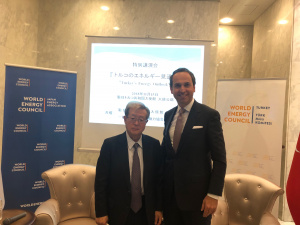Following the opening remarks by Ambassador Mercan and Mr. Masumoto, Chairman of Japanese Member Committee, a 50-minute keynote speech entitled "Energy Transition in Turkey" was given by Deputy Minister Bayraktar. During his speech, Mr. Bayraktar emphasized that Turkey has been striving to achieve stable and affordable energy supply to meet steadily increasing energy demand, while actively introducing renewable energy sources.
The main remarks from his speech were as follows;
-
Turkey has very ambitious goals as far as renewables are concerned. Renewable Energy Zone competitions of solar and wind for 1,000 MW each were completed with historic low prices. The installed capacity of renewable energy sources excluding hydro has reached 13,328 MW. Turkey is planning to add 1,000 MW capacity for each solar and wind, annually, adding 20,000 MW of wind and solar capacity in total within 10 years.
-
Increasing energy saving and energy efficiency can significantly contribute to energy security, the mitigation of import dependency risks, the protection of the environment, and combating climate change. In this regard, Turkey announced the National Energy Efficiency Action Plan in early 2018 which sets out action plans to reduce 14% of primary energy consumption by 2023, through a comprehensive strategy. Sectoral measures set out in the plan include buildings and services, energy, transport, industry and technology, agriculture, and cross-cutting areas. In this front, expertise of Japanese companies provide potential business cooperation.
-
Considering the developments regarding clean coal technologies, Turkey has plans to tender certain fields for using electricity generation up to 5,000 MW. Furthermore, studies concerning liquefaction, gasification, and enrichment of domestic coal are ongoing. In this regard, cooperation from Japanese companies is highly welcome and expected.
-
Regarding natural gas, pipeline gas currently accounts for more than 80%, but the share of LNG is expected to go up more in the future. Therefore, the construction of large LNG storage facilities is planned, and we are expecting Japanese companies to participate.






